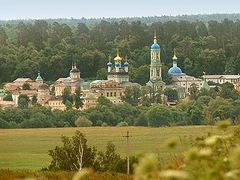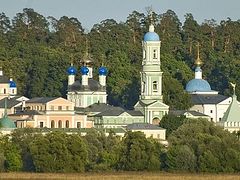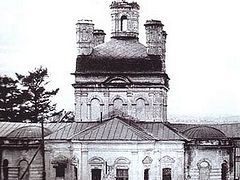Optina Monastery has always been popular among young people, but today they arrive here very often (as we can see). They come by buses, by trains, by cars. They come here as tourists, pilgrims and pilgrim-laborers. They come here with their friends, spouses and alone. Additionally, they all stay here for a long time. Instead of trying to explain the trend by sociology or psychology (or where do we seek answers to our questions?), we preferred to pose the question right to the young generation: Why do they prefer the monastery to fashionable exhibitions and other places?
Alexander. Probably an atheist
Alexander is not a young man, but he was the first I talked to that day. He caught my attention as he rushed out of the Vladimir Church. Meanwhile I was on the church porch looking around for someone from among the crowd to interview for my article. Alexander stood right in front of me; here he was able to record a good video of the domes of the cathedral.
“You have left rather quickly, haven’t you?” said I.
“It’s more important for my wife, she is keen on visiting holy sites. I’d rather say I am an atheist. Probably.”
Here the word “probably” is my favorite.
“You are an atheist, but you say the site is holy.”
“Yeah, I mean Russia’s holy sites are our history.”
It began to rain. It was high time.
“We have recently begun our pilgrimage trips. We have already visited Diveyevo Convent, and now we are here. We have to travel somewhere anyway. We do not feel like travelling abroad. We should travel around and see our homeland.
“Does your heart remain hard while visiting the holy sites?”
“It does,” Alexander returns as if he has foreseen the question. I am an atheist. And a former member of the Communist Party.”
Here I like the word “former”. I feel like talking about the matter with Alexander, but he suddenly goes back into the church. In the meantime, a group of young men catches my attention.
Roma, a chef
I see a young woman and two young men. They have no umbrellas, no raincoats as if there were no rain. They slowly look over the monastery’s holy objects and the elders’ graves and a crucifix. But astonishing is not their ignorance of the rain and lack of haste, but that they look very much like hippies. One of them looks very unusual. Long light hair, wearing a pair of jeans and a chequered shirt. I come to them and introduce myself. Roman is from the city of Kaluga, but he has lived in Kazan for six years now. There he met his wife (the demure smiling girl has stepped aside so as not to interfere in our conversation) and found a job. “I am a cook and spent the year baking pizzas, but I quit shortly before coming here,” said Roman.
“And why did you come to Optina?”
“Why? Roman returns with surprise. We seek salvation…” and after a brief moment of meditation he adds, salvation for everyone. We came for spiritual direction and to Fr. Nikon personally, to talk to him, to hear his advice. We have just visited Klykovo and now we are going to Shamordino.”
Behind this flat explanation, there was an extraordinary story. Later Roman told me the following:
“I came to believe in God when I was an adult. I mean I was relatively adult, nineteen years old. I knew almost nothing of God, I was not brought up in the faith. My mother remains strongly negative towards religion. It does not matter. My wife has a different view, it is more important.
“A friend of mine had come to believe in God a bit earlier than I did, but he never insisted or persuaded, we were just talking about God. And then… I remember the day quite well… I was reading the world news, about wars, explosions, floods, about children murdered somewhere and many other things. I rushed to the church. I saw a priest there, and said: I do not believe, I have no faith, but I desperately want to have it. What should I start with? He said, ‘Pray that you be granted faith.’ That is all. Then I came to the faith.
“It is our fourth time in Optina. The soul longs to come here. The history of this place attracts even atheists.”
As Roman enunciated “history” and “atheists”, I must have turned pale.
“Do you believe history is the only thing that attracts them?”
“A divine spark attracts them. People come here as tourists and leave as pilgrims. I mean, they do not realize where they have come, they have no Christian reason, and this may work. The story of the Red Pascha attracts them, a murder of three monks committed in 1993.
“You believe this story is catchy for the youth today?”
“For me, it is. And the elders. Reading their sayings, you find captivating things. For instance, all men are liars and I am a liar too. These sayings are short, but beautiful. In general, I believe, any Christian soul wants to come here. That is normal.”
Roman and his wife leave me and go towards the chapel built on the place where the three monks were killed in 1993. It is still pouring rain and still no one pays attention to it. Everything is as usual: crowds of pilgrims beside the graves and in the churches, some of the brothers…
Only the notorious monastery crows have become more silent.
Andrey, a future civil servant
I saw Andrey sitting on the bench by the southern monastery wall. He looked fatigue, but serene. He is a pilgrim-laborer, I guessed.
Indeed, he has come to Optina for the third time as a pilgrim-laborer. He usually stays here for fourteen days. This time he is working in the monastery garden. “Yesterday we picked fifteen bags of apples, and I picked sea buckthorn berries, pricked my fingers on the branches,” Andrey is not complaining, I have just asked him to vividly describe the life of today’s pilgrim-worker. “We work mostly in the gardens and farms, cows, horses. There is a lot of work.”
“Are there many young laborers among you?”
“I wish there were more, but there are some. I believe few young men would agree to wake up at five o’clock in the morning, Andrey chuckles.”
Andrey got used to getting up early in the morning. He is a public administration department student at a prestigious Moscow college; he is a future civil servant. “I cannot say I am fond of that. I would rather work people rather than in the State Duma.”
“Why do you come to Optina?”
“I practiced sambo [a Russian martial art] for ten years, but then I had a brain hemorrhage. My health got worse. I am afraid of dying without repentance. This is how I can explain it. That is why I go to monasteries. My father instilled faith in me when I was a child.”
“And I flee the Moscow rush. My schedule is hectic in Moscow; there are many unrelated matters, you are constantly in haste. The Internet, messengers… I come here and think, why do I need all this. Everything is senseless. Eventually, I have to come back home, I have to continue my studies, my parents need me…”
We are sitting in front of the graves of the monastery brothers. Black wooden crosses soar over small mounds covered with flowers. Andrey is contemplating the crosses not as a pilgrim, he is looking through them, through the flowers. He is contemplating in the way that my next question, whether he would like to stay at Optina for the rest of his life, is no longer relevant.
“I have to remain faithful in the world, striving not to fall away from God. It is hard, indeed. We never stop sinning,” Andrey confesses.
“Today criticism of the Church is pervasive. Does it make it harder to find understanding with your peers? Do you have any disputes over religion?”
“The devil has craftily deceived the young generation, all the criticism is in the Internet, and their life is in the Internet. People are not even aware that there is a different world, Optina, there is a different country and a different life. It is becoming increasingly harder to explain to unbelievers the meaning of the Orthodox faith, to speak about priests. Nobody knows that there are priests who are veterans of wars, who do many good things… Priests are usually stereotyped as they are depicted in the Internet. We must stand up for our priests, we definitely must. I usually explain it, I put it like this: Look, you go and buy a loaf of bread. But there are mediators, those who bake the bread and transport it to stores before you can buy it. Without them, there would be no bread. A clergyman is a mediator too; the Church sacraments are impossible without them. A priest is like a mediator, he unites a person with God.”
“I cannot imagine any critical attacks on the Church. The Lord is not mocked.”
The Church bells are inviting everyone for the service. Andrey apologizes and leaves. Leaving, he bows to the small graves he has been contemplating during our entire talk.
Irina, a farmer
I literally caught up with Irina on my way to the Cathedral of the Entrance of the Theotokos into the Temple. The young woman was accompanied by a little boy, whom she was tenderly telling about the elders. In a way, people usually speak about saints that helped them somehow.
“I come from the town of Kirishi, St. Petersburg region. Why did I come here? There are three places on earth I really cherish: the Ploschansk Kazan Monastery in Bryansk, the Pskov Caves Monastery, and Optina. They evoke many memories.”
“What memories do you have of Optina?”
“Once I came across the book, Red Pascha—a book that describes the lives of three Optina new martyrs; they were murdered and I venerate them as saints. One of them, Father Vasily (Roslyakov), Igor in the world, was captain of the USSR national water polo team, and he had great results. I have also been into this kind of sport. I was also a promising athlete. This is why I really attached myself to Optina. This attachment is mutual.”
I notice that it has almost stopped raining. Again, the crows’ screeching penetrates the entire monastery. Everything happens with lightning speed, as if it were a special effect in a film. Irina’s following words seem far more important. (Though someone may say this is a “special effect” that the narrator uses intentionally to underscore what has already been said.)
“That book impressed me indeed. I came here again as I finished it and looked at the murder from a different prospective. I can’t but mention the Optina elders! They make up the foundation, the foundation of all Russia. The same is true about the Pskov Caves and many other elders.”
Irina looks up to the church domes to see a flight of large black birds.
“I came to believe in God long ago, she adds.”
Long ago means since she was a schoolgirl, when she saw a prayer book for the first time. The girl was so impressed that she decided to pray before her studies, school lessons and exercise routine. “I played water polo pretty well. I always felt Protection, His support, and could no longer live without it.” According to Irina, she became a practicing Orthodox Christian when she was “overcoming troubles the of her youth”. Quitting her prestigious career in law was the first thing she did. However, she was a very promising lawyer. “Being a lawyer implies a daily compromise with your conscience. I came to realize I couldn’t bear it any longer.” Now she is a farmer.
In addition, she chants in a church choir in her hometown.
“That’s it, I am in the temple, I am in the Church, I can neither breathe nor do anything in a different way,” Irina confesses. Sometimes, I have to admit, I feel relaxed, but I truly realize there is no way back. This way of life is the only way possible, a life with God.”
“Do you want to know about a true miracle?” Irina surprisingly asks me. Of course, I can’t pass it up.
“Okay, then I will tell you. After my first child was born, I could not have my second child for nine years. My husband and I visited all possible monasteries. By the way, I’d like to note one thing: Women in similar situations turn either to healers or doctors. Doctors are a good thing, but you should first pray to God. So we had been praying in various monasteries, but it didn’t work out. Nine years passed, and we set out for our new pilgrimage. We went to the Pskov-Caves and then to Optina. I entered the chapel built on the place of Father Vasily’s grave. While writing my prayer I felt, “Enough, I won’t be praying for a child any more. I am done imploring, I will not be bothering the Lord with all this. I have a son, glory to God for him.” However, I failed to notice how my hand instinctively wrote about a child… When we came home from Optina, I knew I was pregnant. That’s it! The Optina new martyrs helped me, and Optina became a tipping point.”
They named their second son Semyon. He was the boy to whom Irina was talking about the elders on their way to the cathedral. This is characteristic of the place—people do not come here by chance.
***
It will be neither a lie nor an exaggeration if I claim that any pilgrim you meet at Optina will definitely tell you a unique, captivating story. If you talk to two hundred people, you will hear two hundred stories. For example, I also met an actress from Kaluga, who came here after she had reread Tolstoy. Another girl, working for a foreign motor company, came to the holy place to celebrate her birthday. Moreover, I heard the story of an Iranian. He had been keen on European culture, but was disappointed. Then he was travelling around Russia in search of the meaning of life. He left Optina a different person.
This year the youth has one more reason to visit the monastery, as the Optina Lecture Course has been launched. Renowned scholars and all enthusiasts are trying their best to answer the most relevant questions. Stories of celebrated Russians are instrumental. For instance, of Leo Tolstoy who arrived at Optina for the first time when he was a teenager. Here he wrote words that remained here for ages, an inscription on his aunt’s tomb. Tolstoy’s opponent, Konstantin Leontiev, was also much attached to Optina since his childhood. “Do not go to Optina with me, otherwise I will stay there,” he said to his mother. Vladimir Solovyov was among the Russian philosophers who visited Optina as young men. By the way, it was he who showed the monastery to Fyodor Dostoevsky. Everyone is aware of how that trip affected the Golden Age of Russian literature. Young and already famous, Anna Akhmatova, a landmark poet of both the Silver Age and the Sixtiers, learned here a “lesson of light faith”. Here Michael Chekhov, as a young man, came to know what eldership was—the Chekhov whose system laid the foundations of Hollywood.








